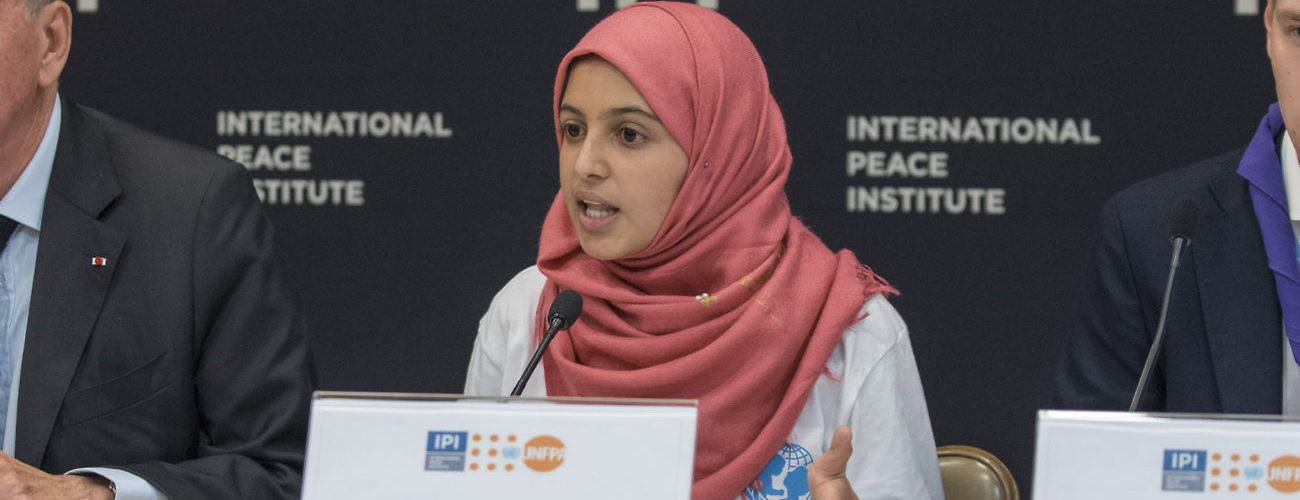Muzoon Almellahan was forced to flee Syria in 2013, to spend three years in crowded refugee camps in Jordan before being resettled with her family in the British city of Newcastle, where she is now a high school senior taking university preparatory courses.
“Leaving Syria, my dad told me I couldn’t bring everything and only to bring the most important things, so I told myself to pack my schoolbooks because I believe in education,” she said.
Remembering her departure four years ago from the besieged Syrian city of Da’ara, she said, “I carried with me my hope, and I carried with me my books.”
Filling her bag with books was a decision that led this year to her becoming at age 19 the youngest UNICEF Goodwill Ambassador ever appointed, and a No Lost Generation (NLF) campaign champion for UNICEF Middle East and North Africa. She told her stirring story at a September 18th lunchtime event co-sponsored by IPI and the United Nations Population Fund (UNFPA), entitled “The Role of Young People in the Global Compacts for Refugees and Migration.”
The new global compacts referred to are to be signed next year, to deal with, respectively, commitments to “refugee responsibility-sharing” and “safe, orderly and regular migration,” set in motion by the 2016 adoption of the New York Declaration. The event was designed to provide a platform for young people and their advocates to discuss directly with lead UN and other agencies involved in the consultations and negotiations for the two compacts.
For Ms. Almellahan, the choice of what to focus on was easy. “What I saw in the refugee camp was that many boys and girls had lost hope. They felt that as refugees, it was not important for them to be educated people.” She said that Syria and the world need a strong young generation, “but we cannot build that strong generation without education.”
Julius Kramer, Youth Adviser to the executive board of the World Organization of the Scout Movement, agreed on the centrality of education in helping migrants to adapt to new lands but spoke too of the “non-formal education” that he and his fellow scouts provide in his native Sweden, the country that leads all others in Europe in the per capita number of migrants it received.
“The non-formal education that we do and the safe spaces we create for young people become so much more important when kids don’t have access to formal education in a humanitarian setting,” he said. “Scouts don’t need a classroom to operate.”
Jayathma Wickramanayake, a 26-year-old Sri Lankan who is the UN Secretary-General’s Envoy on Youth, said that the humanitarian community and youth were finding common cause. “From Jordan to Myanmar, from Haiti to Tanzania, from Germany to Greece,” she said, “humanitarian actors are creating spaces for young people, and young people are rolling up their sleeves to increase humanitarian effectiveness and reduce vulnerability, to introduce innovative solutions to serve the needs of affected populations, building hope and resilience in all corners of the world.”
Speaking of the importance of the two global compacts to the world’s youth, Fillipo Grandi, the United Nations High Commissioner for Refugees, pointed out that the majority of the estimated 66 million people who have been forced to flee their homes are young people, as are the majority of people living in the receiving countries. “Remember,” he said, “90 percent of the 66 million are in low or middle income countries where the youth bulge is the biggest.”
And because the average period of exile is 15 to 20 years, he added, young people can end up living their entire youth in exile. “So it’s young people who have the most to lose from an unsupported exile,” he said, signaling education, self-reliance and jobs are the most neglected needs. “We must make sure their needs are adequately reflected,” he said.
Ulla Tørnǣs, the Minister for Development Cooperation of Denmark, said that she had recently been in South Sudan and found that an adolescent girl there is three times more likely to die in childbirth than complete primary school. “This is truly heart-breaking,” “she said and illustrated the need for the compacts to reflect “the nexus between short-term humanitarian assistance and more long-term development cooperation.”
Tørnǣs used her remarks to make a consequential announcement, declaring that Denmark will formally join the Compact for Young People in Humanitarian Action, joining over 50 member organizations who have endorsed the Compact thus far.
In closing remarks, Elhadj As Sy, Secretary-General of the International Federation of the Red Cross and Red Crescent Societies, told the young participants that “you humbly said that we young people need you, but I can tell you that we all need young people to inspire, to tell your stories, to lead today and in the future, to question the challenges and push the envelope.”
Making opening remarks were Benoit Kalasa, Director of the Technical Division of UNFPA, and IPI President Terje Rød–Larsen, who also moderated the discussion.








